Relying solely on your WooCommerce store for sales may no longer be enough in today’s diverse eCommerce ecosystem. Consumers are scattered across platforms—Amazon, eBay, Google Shopping, Instagram, and even offline POS systems. If you’re not selling where your customers are spending their time, you’re missing out on potential revenue. That’s exactly where WooCommerce Multiple Sales Channel Plugins come into play.
These plugins integrate your WooCommerce store with various platforms, allowing you to manage inventory, sync products, track orders, and centralize operations. Whether you’re expanding into online marketplaces or social commerce, having the right tools to handle multiple sales channels is essential for scalability, efficiency, and staying competitive.
In 2025, where omnichannel strategies dominate eCommerce best practices, using WooCommerce Multiple Sales Channel Plugins is no longer optional—it’s a necessity. These plugins eliminate the need for manual updates, reduce errors, and streamline operations, making it easier for store owners to scale their businesses across multiple platforms.
In the sections ahead, we’ll explore the top 10 WooCommerce plugins that empower multi-channel selling. We’ll also break down what they do, why they matter, and how they benefit your store operations.
What Are WooCommerce Multiple Sales Channel Plugins and Why Are They Important?
WooCommerce Multiple Sales Channel Plugins are specialized tools that help connect your WooCommerce store with other online and offline platforms—such as Amazon, eBay, Etsy, Google Shopping, Facebook, Instagram, and even POS systems. These plugins create a centralized system where product listings, inventory, orders, and customer data can be managed from one WooCommerce dashboard across all active channels. Instead of juggling multiple admin panels, store owners can streamline their operations and ensure data consistency across platforms.
These plugins typically offer automation for syncing stock levels, pricing updates, order management, and sometimes even listing optimization. Depending on the plugin, they may support two-way data synchronization, bulk product uploads, currency adjustments, tax compliance, and more.
Why Are They Essential in 2025?
With the sharp rise in multichannel eCommerce, consumers are no longer shopping from a single source. They may find your product on Google, check it again on Amazon, and eventually buy it via your WooCommerce store or social media. If your presence is limited to just one channel, you’re essentially turning away a significant portion of potential buyers.
Using WooCommerce Multiple Sales Channel Plugins enables you to:
- Reach customers where they prefer to shop, whether it’s a marketplace, search engine, or social app.
- Avoid overselling by maintaining real-time inventory updates across platforms.
- Reduce manual errors through automated order and listing synchronization.
- Scale your business faster by diversifying revenue streams without duplicating efforts.
For any WooCommerce store aiming for sustainable growth in 2025, leveraging these plugins is a smart, data-driven strategy—not just a convenience.
Advantages of WooCommerce Multiple Sales Channel Plugins
Using WooCommerce Multiple Sales Channel Plugins can drastically improve how your eCommerce business operates, especially when managing multiple marketplaces and digital storefronts. These plugins aren’t just tools for convenience—they’re essential for business scalability, efficient operations, and consistent customer experience across all sales channels.
1. Centralized Product Management
Managing product data individually on Amazon, Etsy, eBay, Facebook, and your WooCommerce store can be overwhelming. These plugins offer centralized control. You can update prices, product descriptions, SKUs, or inventory levels once and sync across all platforms automatically—minimizing errors and saving time.
2. Real-Time Inventory Synchronization
Overselling or running out of stock on one platform while it’s still marked as available on another can damage credibility. Multichannel plugins sync your inventory in real time, ensuring every platform reflects the correct stock level. This enhances trust and prevents order cancellations.
3. Streamlined Order Processing
Instead of managing orders on multiple dashboards, these plugins consolidate them into your WooCommerce admin panel. You can fulfill, refund, or update orders from a single source—reducing complexity and improving order accuracy.
4. Expanded Market Reach
By listing products on marketplaces like Amazon or eBay, or through social platforms like Facebook Shops or Instagram Shopping, you’re tapping into vast audiences. This expansion increases brand visibility and sales without needing additional websites or staff.
5. Faster Scaling with Lower Overhead
Selling across multiple platforms usually means hiring more staff or outsourcing management. WooCommerce Multiple Sales Channel Plugins reduce the manpower needed, allowing you to scale your operations without proportionally increasing your costs.
6. Better Data and Reporting
Many of these plugins come with built-in analytics or integrate with tools like Google Analytics and Facebook Pixel. You get insights into sales by channel, top-performing products, and customer behavior—critical for strategic decision-making.
7. Improved Customer Experience
Customers receive faster order updates, accurate product availability, and consistent information across all channels. This builds trust and contributes to higher satisfaction and repeat purchases.
8. Automation Saves Time
Repetitive tasks like syncing listings, updating product attributes, and pushing inventory changes are automated. This allows store owners to focus on strategy, marketing, and customer service.
1. YITH WooCommerce Multi Vendor / Marketplace

YITH WooCommerce Multi Vendor / Marketplace transforms your WooCommerce store into a fully operational multi-vendor marketplace, similar to Amazon or Etsy. It enables multiple sellers to list and manage their products under your store umbrella, letting you earn commissions from each sale.
- Vendor registration, approval, and individual dashboards
- Dedicated vendor shop pages with vendor-specific product listings
- Global or vendor-specific commission structures
- Admin control over product publishing and order handling
- Integration with YITH payment plugins for easy revenue distribution
- Advanced filtering and vendor rating systems for customers
- Backend analytics and reports per vendor
Price:
Premium version starts at €149.99/year, which includes 1 year of updates and support. A free version with limited features is also available in the WordPress plugin directory.
- Revenue Diversification: You can monetize your store through commissions, product listing fees, and premium services for vendors.
- Scalability: Ideal for scaling your WooCommerce site into a full-fledged marketplace without custom development.
- Reduced Inventory Management: Vendors manage their listings and inventory, reducing your backend workload.
- Improved Product Variety: Multiple sellers offer a wide range of products, increasing the likelihood of conversions.
- Vendor Independence: Each vendor can have unique shipping, tax, and refund policies while staying within the framework of your store.
- Community Building: Supports user ratings and vendor profiles, adding transparency and trust to the buying process.
2. Multichannel for WooCommerce by CedCommerce

Multichannel for WooCommerce by CedCommerce is a robust integration solution for syncing your WooCommerce store with major online marketplaces like Amazon, eBay, Walmart, and Etsy. It simplifies listing management, order synchronization, and inventory control across all platforms.
- Bulk upload and edit product listings across all supported channels
- Real-time inventory syncing to prevent overselling
- Auto-fetch orders from marketplaces into WooCommerce
- Centralized order management with tracking and status updates
- Product category mapping and attribute customization per channel
- Multi-account support for each marketplace
- Inbuilt error log and activity tracker for debugging sync issues
Price:
Starts at $199/year for a single marketplace integration. Bundled plans for multiple channels (like Amazon + eBay + Walmart) are available at custom pricing depending on store needs.
- Wider Market Reach: Seamlessly connect to the world’s largest marketplaces, increasing exposure and sales potential.
- Centralized Control: Manage product listings, stock, and orders from one WooCommerce dashboard without switching between accounts.
- Scalable Operations: Handle high volumes of listings and orders with automated synchronization, perfect for growing stores.
- Compliance Friendly: Includes marketplace-specific fields and settings to ensure your listings meet platform standards.
- Reduced Errors: Automation reduces human error in pricing, inventory updates, and order processing.
- Support & Documentation: Comes with dedicated onboarding support and detailed documentation for each integration.
3. LitCommerce – Multichannel Selling for WooCommerce

LitCommerce – Multichannel Selling for WooCommerce is a dedicated multichannel integration solution that connects WooCommerce stores to major marketplaces like Amazon, eBay, Etsy, Walmart, and TikTok Shop. Designed with simplicity and scalability in mind, LitCommerce enables merchants to expand their online presence effortlessly while managing all sales channels from a single platform. It’s particularly suitable for small to mid-sized businesses looking to grow their reach without switching between multiple dashboards.
- One-click integration with top sales channels, including Google Shopping and Facebook Shop
- Centralized product listing and inventory management
- Automated order syncing between WooCommerce and external channels
- Bulk listing, template creation, and real-time stock updates
- Native currency and language support for international selling
- Performance analytics for each connected channel
- Built-in error diagnostics to handle syncing or mapping issues
Pricing:
LitCommerce provides a Free Forever plan for startups, with basic features and limited listings. Paid plans start at $29/month, depending on the number of channels and listings needed. Annual billing saves users up to 20%, and all plans come with free onboarding and customer support.
- Helps WooCommerce store owners sell across multiple marketplaces without technical complexity
- Inventory is auto-synced across all channels, reducing overselling risks
- Saves hours of manual work with its bulk editing and template features
- Provides a scalable solution with flexible pricing tiers suitable for growing businesses
- Highly rated for ease of use and fast customer support response
4. ChannelEngine – Multichannel eCommerce Integration for WooCommerce

ChannelEngine is a powerful enterprise-grade integration platform that connects WooCommerce stores with 700+ global marketplaces, including Amazon, Zalando, Bol.com, eBay, and more. Tailored for ambitious businesses aiming for international expansion, ChannelEngine offers advanced automation tools and enterprise-level data syncing for seamless multichannel commerce operations.
- Integration with 700+ channels across Europe, North America, Asia, and the Middle East
- Real-time inventory sync and dynamic pricing updates
- Rule-based product listing management
- Order routing across warehouses and dropshippers
- Multilingual and multi-currency support
- Integration with ERP, PIM, WMS, and shipping platforms
- API access for custom workflows and extensions
- Built-in compliance tools for local marketplace regulations
Pricing:
ChannelEngine’s pricing is tailored based on your business size and needs. While they don’t list flat-rate plans publicly, you can request a custom quote based on the number of connected marketplaces and sales volume. It’s ideal for mid-to-large businesses looking for a comprehensive multichannel infrastructure.
- Provides access to global marketplaces with full localization support
- Saves time and reduces human error through automation and centralized control
- Offers unmatched flexibility with API integrations and enterprise connectors
- Includes rich analytics for a data-driven expansion strategy
- Scales seamlessly for businesses selling in high volumes across continents
5. Shopify Connector for WooCommerce by CedCommerce
The Shopify Connector for WooCommerce is a robust solution from CedCommerce that enables WooCommerce store owners to integrate and sell across Shopify. This plugin is perfect for businesses that operate on both platforms and want to unify inventory, orders, and product data between WooCommerce and Shopify without manual syncing or complicated workflows.
- Sync products, inventory, orders, and pricing between Shopify and WooCommerce
- Real-time updates between both stores
- Supports both simple and variable product types
- Bulk upload and update tools for faster listing management
- Track order status and fulfillment in one unified panel
- Automated inventory balancing to avoid overselling
- Compatible with subscription and multilingual stores
- 24/7 CedCommerce support and onboarding
Pricing:
The plugin is free to install on CedCommerce but requires a paid subscription for full features. Plans start at $29/month, depending on listing volume and data sync requirements.
- Ideal for businesses running parallel WooCommerce and Shopify stores
- Helps eliminate manual reconciliation between platforms
- Prevents stock mismatches with auto inventory updates
- Enables unified product catalog management
- Boosts efficiency and reduces time spent on cross-platform operations
6. WooMultistore – Multi Store Sync for WooCommerce
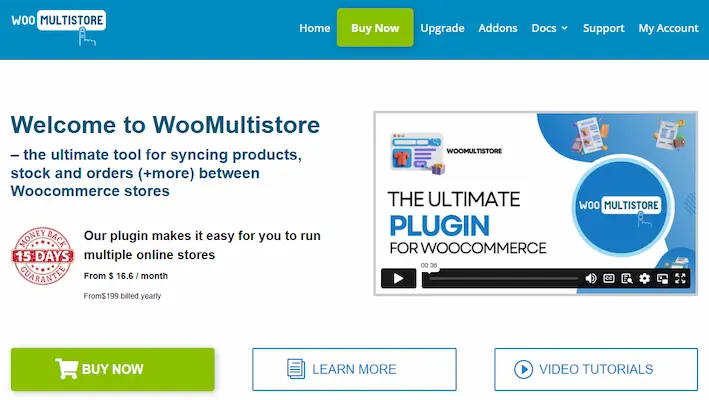
WooMultistore is a powerful plugin built for WooCommerce stores managing multiple shops from a single WordPress network. Whether you’re running a chain of localized stores or segmenting by brand or language, this plugin allows you to centrally manage products, inventory, orders, and pricing while syncing data across all stores instantly.
- Centralized product management across multiple WooCommerce stores
- Real-time synchronization of stock, product details, categories, and pricing
- Separate order management per store with global reporting
- Automatic product duplication across stores with control over syncing scope
- Custom product titles, prices, and descriptions for each store
- Multi-language and multi-currency compatible
- Works with both subdomains and entirely separate domains
- API integrations for third-party tools
Pricing:
WooMultistore licenses start at €199/year for 3 stores. Pricing scales based on the number of connected stores, with custom plans available for large networks.
- Best suited for large eCommerce operations or regional/brand segmentation
- Saves countless hours through centralized control
- Reduces stock management errors across stores
- Allows customized content and pricing per store without breaking sync
- Offers better operational efficiency and scalability for expanding businesses
7. Expandly – Multichannel Management for WooCommerce.
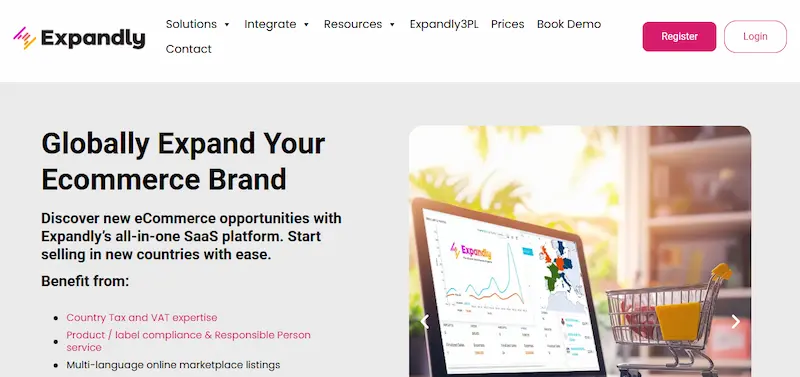
Expandly is a professional multichannel eCommerce software that integrates directly with WooCommerce and connects it to top online marketplaces like Amazon, eBay, Etsy, Wish, and more. Aimed at growing and enterprise-level businesses, Expandly enables centralized control of product listings, inventory levels, order management, and shipping operations across all sales platforms.
- Bulk product listing and editing across multiple marketplaces
- Real-time inventory synchronization across WooCommerce and other platforms
- Centralized order processing dashboard
- Shipping integrations with leading carriers like Royal Mail, USPS, and DHL
- Supports complex product variations and bundles
- Detailed analytics and sales performance reports
- Multi-location stock control and warehouse integration
- Supports multi-currency and global tax configurations
Pricing:
Expandly’s pricing starts at £100/month (approximately $125/month) with custom enterprise-level pricing available based on business scale and usage. A free trial is also offered.
- Designed for scalability—ideal for growing stores and large catalogues
- Professional support and onboarding assistance
- Advanced features for shipping, tax, and inventory
- Reduces manual effort through automation tools
- Integrates with accounting software like Xero and QuickBooks
- Improves operational accuracy and lowers fulfillment errors
8. ShoppingFeeder for WooCommerce
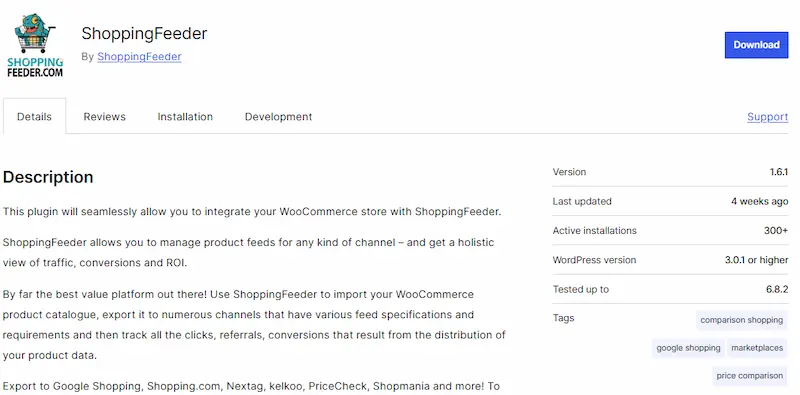
ShoppingFeeder for WooCommerce is a powerful feed management and multichannel marketing tool that helps WooCommerce merchants promote and sell products across numerous sales and advertising channels, including Google Shopping, Facebook Catalog, Bing, PriceCheck, and more.
- Supports feed creation and optimization for over 100 channels
- Integrates with Google Merchant Center, Meta, TikTok, Pinterest, and affiliate networks
- Real-time product sync and availability tracking
- Advanced filtering, mapping, and custom rules for feed customization
- In-depth reporting for feed performance and ROI tracking
- Handles variations and multi-language feeds
- Multiple currencies and geo-targeted feed support
Pricing:
ShoppingFeeder has a free plan with limited access, ideal for startups. Paid plans begin at $11/month, depending on the number of products and channels selected.
- Ideal for product visibility on both sales and ad channels
- Deep analytics for marketing decision-making
- Flexible and scalable for growing stores
- Supports global feed requirements with currency/localization options
- Compatible with most major affiliate and comparison sites
- Excellent customer support and onboarding
9. Koongo – WooCommerce Multichannel Integration
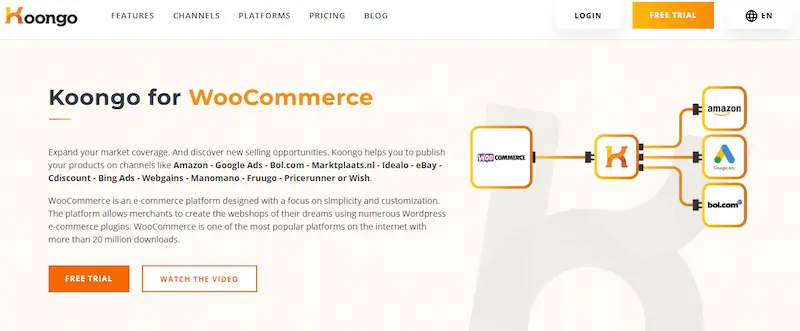
Koongo is a robust multichannel integration platform that connects WooCommerce to a wide range of global marketplaces like Amazon, eBay, Zalando, Beslist, Miinto, and over 500 marketing and comparison channels. It’s known for strong marketplace compliance and tailored product feed solutions.
- Auto-sync for product listings, orders, and stock
- Real-time data exchange with 500+ global sales and ad platforms
- Custom feed creation tools for complete control
- Centralized order and performance management
- Direct API integrations with large marketplaces
- Multi-country and multi-currency support
- Built-in marketing automation tools
Pricing:
Koongo offers a 15-day free trial. Subscription pricing starts at €24/month, based on store size and integration needs. Marketplace order sync is charged as an add-on.
- Highly flexible feed and marketplace integration
- Broadest marketplace support across Europe and beyond
- Deep compliance with listing and tax rules per region
- Saves time with bulk automation and mapping
- Perfect for cross-border WooCommerce selling
- Dedicated account support and API access
10. ChannelUnity for WooCommerce
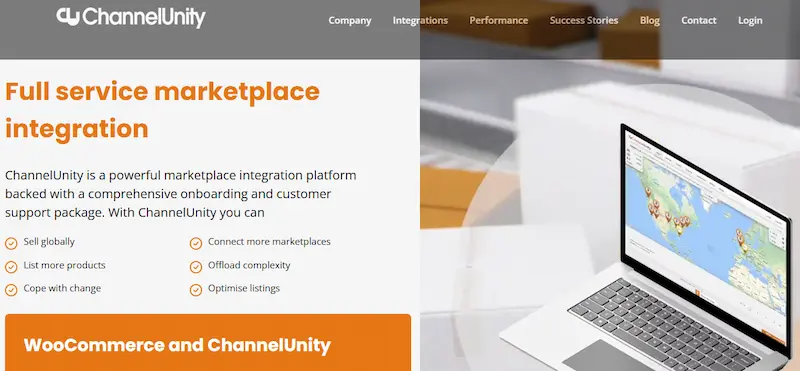
ChannelUnity is an advanced multichannel integration platform designed to help WooCommerce stores synchronize inventory, manage listings, and process orders across leading marketplaces like Amazon, eBay, Walmart, Wayfair, and more. It’s ideal for merchants who want seamless, high-volume listing management and full automation.
- Real-time product and stock sync between WooCommerce and global marketplaces
- Bulk listing tools for Amazon, eBay, Cdiscount, etc.
- Unified order processing dashboard across channels
- Price adjustment rules for each marketplace
- Auto-import customer and order data into WooCommerce
- Detailed listing error reporting and fix suggestions
- Supports multi-region and multi-language marketplaces
Pricing:
ChannelUnity offers a free trial. After that, plans are customized based on order volume and marketplaces, typically starting at around $50/month for small businesses.
- Designed for serious multichannel scaling and automation
- Saves time with bulk listing and order syncing
- Reduces overselling risks through real-time inventory control
- Excellent for global marketplace compliance
- Built-in error detection and auto-correction tools
- Handles high-SKU catalogs efficiently
Expand Smarter with WooCommerce Multiple Sales Channels
Running a WooCommerce store doesn’t mean you need to limit your sales to just one storefront. Leveraging WooCommerce multiple sales channels opens up powerful growth opportunities—be it through Amazon, eBay, Etsy, Walmart, social platforms, or other custom marketplaces. The right plugin allows you to connect, sync, and manage all these platforms in one place, giving you both operational control and marketing reach.
- Want to reach global audiences? Go for Amazon/eBay integrations.
- Building a marketplace? Pick a vendor-focused plugin.
- Managing multiple Shopify, WooCommerce, or Magento stores? Use centralized syncing tools.
By adopting a multichannel sales strategy, you’re not just increasing visibility—you’re future-proofing your WooCommerce business. The more access points you create for your customers, the greater your potential revenue becomes. Just make sure the plugin you choose supports reliable automation, real-time inventory updates, and seamless channel management. With the right setup in place, your WooCommerce store can thrive in a highly competitive, multi-platform ecommerce landscape.





